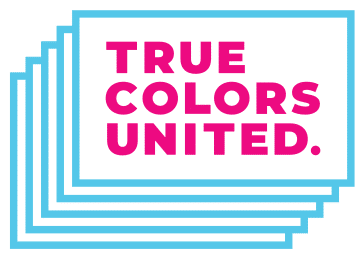Spread the Word.
Sample social media posts.
PROMOTIONAL POSTS:
Everyone deserves a safe home. No exceptions. Take the #TrueColorsDay pledge to take action on April 24. truecolorsday.org
Here’s what I believe. Are you with me? Take the #TrueColorsDay pledge and let’s take action on April 24. truecolorsday.org
SAMPLE EMAIL & BLOG CONTENT:
Housing is a Human Right.
The wave of anti-LGBTQ+ bills sweeping the country and the impending case of Johnson v. Grants Pass share a profound interconnection, both revolving around the rights and well-being of LGBTQ+ individuals, particularly those facing homelessness.
These anti-LGBTQ+ bills, with their discriminatory provisions, exacerbate the challenges already plaguing transgender youth, pushing many toward homelessness. By restricting access to gender-affirming healthcare, limiting restroom and sports participation rights, or fostering hostile school environments, these bills contribute to an atmosphere of marginalization and exclusion.
Simultaneously, the Johnson v. Grants Pass case addresses the legality of criminalizing individuals for being homeless, a disproportionate number of whom are transgender. The case originated in Grants Pass, Oregon, where the city authorities began issuing citations to individuals found sleeping in public spaces, despite the insufficient availability of secure and accessible shelter accommodations. The outcome of this case will have far-reaching implications for homeless trans individuals, as it determines whether cities can criminalize their existence simply for lacking adequate shelter options.
In essence, both the anti-LGBTQ+ bills and the Johnson v. Grants Pass case underscore the systemic barriers and injustices faced by transgender individuals, particularly those who are homeless or at risk of homelessness. They highlight the urgent need for comprehensive legal protections and societal support to ensure the dignity and rights of all transgender people are upheld.
Get Educated and Educate Others
As you continue learning about the severity of anti-LGBTQ+ s bills prevailing across the country, educate others on why these bills are so harmful. There are several organizations across the country offering resources, guides, and educational materials that promote community understanding and acceptance of transgender and gender-diverse folx. You can find a list of resources here.
Stay Informed
There are several ways to stay informed and find out when bills are being introduced, discussed, and moving through the legislative process. You can find out where and when bills are being discussed and show up to watch them online. You can also look up active bills and track their progress via LegiScan.
Reach Out To Your Legislators
If you live in a state where anti-LGBTQ+ bills are being considered, reach out to your state legislators and tell them about your concerns. You can call your state legislator and ask for a meeting, visit legislators during office hours, or send an email. It’s also important to remember that even if asking works initially, you will likely have to keep the pressure on your target to ensure follow-through. You can find your state legislator here.
Engage in digital advocacy
Using digital tools for advocacy and organizing! Be where your audience is and where you can influence the most people to join your message. To avoid spreading your energy and resources too thin, you shouldn’t commit to being on every social media platform. Make digital participation the easiest thing for your audience. Depending on your goals, ask yourself how it would be best for your audience to engage, and then make it very simple for them.
Learn more about taking action by reading through our Advocacy Toolkit.
